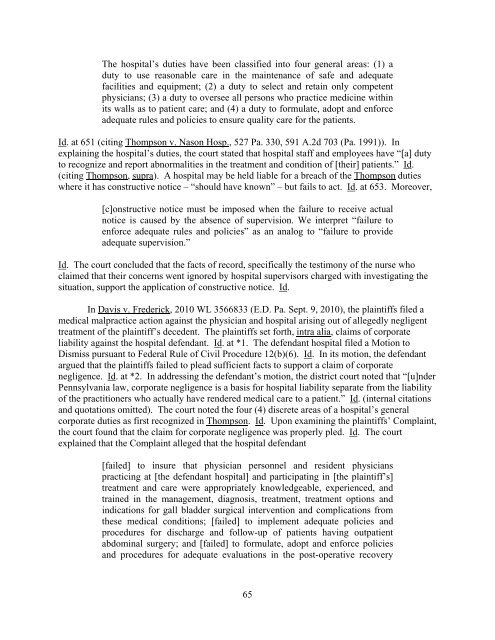2012 PROFESSIONAL LIABILITY UPDATE - Eckert Seamans
2012 PROFESSIONAL LIABILITY UPDATE - Eckert Seamans
2012 PROFESSIONAL LIABILITY UPDATE - Eckert Seamans
You also want an ePaper? Increase the reach of your titles
YUMPU automatically turns print PDFs into web optimized ePapers that Google loves.
The hospital’s duties have been classified into four general areas: (1) aduty to use reasonable care in the maintenance of safe and adequatefacilities and equipment; (2) a duty to select and retain only competentphysicians; (3) a duty to oversee all persons who practice medicine withinits walls as to patient care; and (4) a duty to formulate, adopt and enforceadequate rules and policies to ensure quality care for the patients.Id. at 651 (citing Thompson v. Nason Hosp., 527 Pa. 330, 591 A.2d 703 (Pa. 1991)). Inexplaining the hospital’s duties, the court stated that hospital staff and employees have “[a] dutyto recognize and report abnormalities in the treatment and condition of [their] patients.” Id.(citing Thompson, supra). A hospital may be held liable for a breach of the Thompson dutieswhere it has constructive notice – “should have known” – but fails to act. Id. at 653. Moreover,[c]onstructive notice must be imposed when the failure to receive actualnotice is caused by the absence of supervision. We interpret “failure toenforce adequate rules and policies” as an analog to “failure to provideadequate supervision.”Id. The court concluded that the facts of record, specifically the testimony of the nurse whoclaimed that their concerns went ignored by hospital supervisors charged with investigating thesituation, support the application of constructive notice. Id.In Davis v. Frederick, 2010 WL 3566833 (E.D. Pa. Sept. 9, 2010), the plaintiffs filed amedical malpractice action against the physician and hospital arising out of allegedly negligenttreatment of the plaintiff’s decedent. The plaintiffs set forth, intra alia, claims of corporateliability against the hospital defendant. Id. at *1. The defendant hospital filed a Motion toDismiss pursuant to Federal Rule of Civil Procedure 12(b)(6). Id. In its motion, the defendantargued that the plaintiffs failed to plead sufficient facts to support a claim of corporatenegligence. Id. at *2. In addressing the defendant’s motion, the district court noted that “[u]nderPennsylvania law, corporate negligence is a basis for hospital liability separate from the liabilityof the practitioners who actually have rendered medical care to a patient.” Id. (internal citationsand quotations omitted). The court noted the four (4) discrete areas of a hospital’s generalcorporate duties as first recognized in Thompson. Id. Upon examining the plaintiffs’ Complaint,the court found that the claim for corporate negligence was properly pled. Id. The courtexplained that the Complaint alleged that the hospital defendant[failed] to insure that physician personnel and resident physicianspracticing at [the defendant hospital] and participating in [the plaintiff’s]treatment and care were appropriately knowledgeable, experienced, andtrained in the management, diagnosis, treatment, treatment options andindications for gall bladder surgical intervention and complications fromthese medical conditions; [failed] to implement adequate policies andprocedures for discharge and follow-up of patients having outpatientabdominal surgery; and [failed] to formulate, adopt and enforce policiesand procedures for adequate evaluations in the post-operative recovery65









